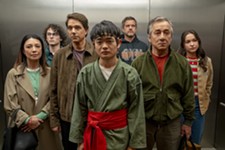
In Our Day
2024, NR, 84 min. Directed by Hong Sang-soo. Starring Gi Ju-bong, Kim Min-hee.
REVIEWED By Richard Whittaker, Fri., June 14, 2024
It seems absurd to consider that Hong Sang-soo is capable of looking backwards. With 34 features to his name, as well as shorts and anthology installments, the breathtakingly prolific South Korean filmmaker crafted his latest, A Traveler's Needs starring Isabelle Huppert, before 2023’s In Our Day could get its U.S. theatrical release.
That alacrity and energy of creation is far from his on-screen signature style, which leans towards static shots of seemingly trivial conversations. In the case of In Our Day, the initial subject is pets – most especially the fluffy cat belonging to a friend of Sangwon (Hong’s longtime collaborator and partner Kim), an actress giving up the business as she indulges in a little bit of day drinking. For poet Uiju (Ki), booze is off the table due to medical reasons, so he gives a little spice to his life by adding fiery gochujang to his ramyun.
What’s the connection between the performer and the poet? None. What links them are resonances. Sangwon is spending the day with a couple of younger friends as she mulls her future. Uiju is hosting a couple of students – one an admirer of his, the other a documentarian working on a film about him. They are two artists facing a midlife existential crisis, and that’s a ripe topic for a filmmaker like Hong, whose works often seem like responses to his own here and now. It’s not hard to see In Our Day as a sexagenarian artist at the periphery of success (awards and plaudits from your peers don’t pay the bills) wondering about the nature of satisfaction.
At this point, it’s hard to say that anyone other than a complete newcomer is going to have their opinion of Hong shifted at all by In Our Day. For anyone who finds his films stagnant and static, it stands as one of his most distancing works. The locked-off digital camera shots lack the celluloid warmth of his earlier works. The Brechtian chapter titles that lay out what’s to come lean ever heavier into the alienation part of the Alienation Effect. The semi-improvised conversations are more didactic than ever, and the disconnect between the two parallel plots is only accentuated by a handful of mirrored components, like seasonings and guitars. But for those already intrigued by Hong’s catalog, this is like reuniting with an old friend. His diptych approach to filmmaking isn’t about juxtaposition but divergence. Sangwon is forced into revelatory conversations, while Uiju has opened himself up to two relative strangers so that they can probe him. Her contemplations of her life seem more urgent than his philosophical ruminations. It’s up to the audience to extract the meanings here, the shared aspects and individual traits informed by age, gender, outlook, demeanor that these two similar-but-different artists experience in their similar-but-different settings.
Ultimately, and as is to be expected, In Our Day is not revelatory or revolutionary. It’s a film about being comfortable from a filmmaker who is comfortable with who he is. Hong has often cited artist Paul Cézanne as a major influence, and that seems apt for a film that feels like a worthy addition to an existing exhibition, rather than the opening of a whole new gallery wing.
A note to readers: Bold and uncensored, The Austin Chronicle has been Austin’s independent news source for over 40 years, expressing the community’s political and environmental concerns and supporting its active cultural scene. Now more than ever, we need your support to continue supplying Austin with independent, free press. If real news is important to you, please consider making a donation of $5, $10 or whatever you can afford, to help keep our journalism on stands.
Richard Whittaker, Dec. 27, 2024
May 31, 2025
In Our Day, Hong Sang-soo, Gi Ju-bong, Kim Min-hee









